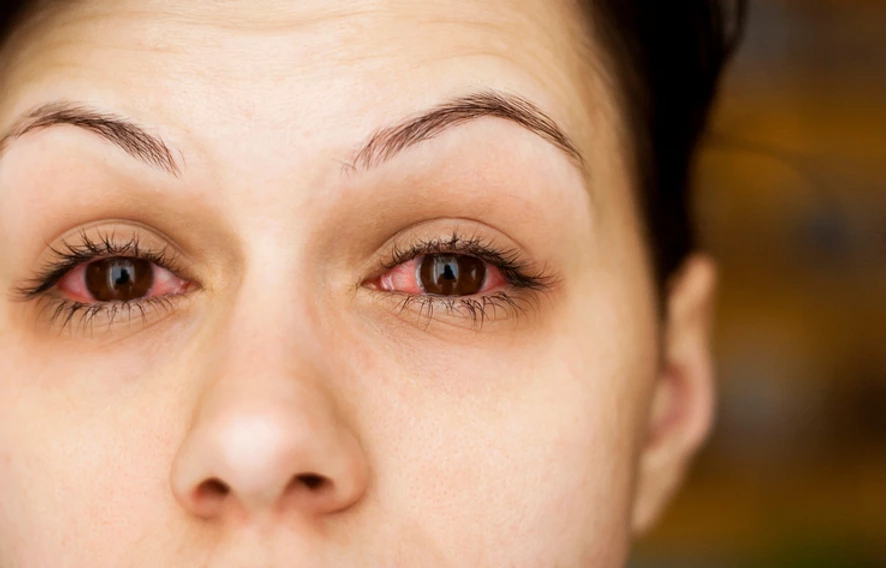With winter bearing down on us, pink eye, red eyes, and irritated eyes are becoming a regular occurrence. What do you need to know about it and what should you do?
First of all, pink eye is a general term that is used any time people have red or pink, swollen, itchy, irritated, watery, or even painful eyes. The main thing to needs to be done is to find out the cause behind those pink eyes in order to treat it accordingly. Applying the wrong treatment without properly examining the eye will at best, not help and at worst, cause permanent vision problems. An optometrist, including the team here at York Medical Eye Care, is trained and has the necessary equipment in order to diagnose and treat these problems. We use a slit lamp, which is an eye microscope in order to look at the eye in detail. In my clinic, I see at least one person a day with some sort of eye irritation. If this is you, go see an optometrist today.
Here are some common causes of pink eye and what you should know about them. Remember though, it is impossible to determine which of these problems you have without careful examination.
Viral Conjunctivitis
This is a common cause of pink eye. Viral conjunctivitis is from a viral infection of the eye. Usually the eyes will appear inflamed, red, or pinkish and will be very watery. This is also almost always accompanied by a cold or flu. This especially happens during the fall and winter seasons.
Like with any cold or flu, this will resolve within a week or two. However, there are complications that can arise from viral conjunctivitis that require treatment from medicated eye drops in order to prevent further vision problems. Another important aspect of viral conjunctivitis is that there are certain strains of viruses that can be highly contagious. It is best to avoid contact with others if possible and to frequently wash your hands in order to not spread this virus to others. As an optometrist, there is a careful cleaning regimen I follow every time I see someone with viral conjunctivitis.
Bacterial Conjunctivitis
This is from an bacterial infection in your eye. Usually the eyes will be very red and irritated, and also painful. There also may be some mucousy discharge. After careful examination with a slit lamp to determine where in the eye the infection is occurring, these problems are usually treated with an antibiotic.
These problems need to be treated quickly. Delaying treatment can potentially end with a scarring in the cornea, which can lead to permanent vision problems. Imagine you have a cut on your skin. This can sometimes become infected and leave a bit of scar after it heals. A small scar on your skin is not a big problem. If this happens in your cornea, is is possible that this may affect your vision.
Allergic Conjunctivitis
These are problems caused by an allergic reaction in the eye. Signs will usually be an inflamed, pinkish, watery, and itchy eye. The itching will feel worse the more you rub your eye. These problems are common in the spring and fall. During examination, an optometrist will be able to see signs, especially in the eyelids, that are caused by your allergic response. These can usually be treated with medicated eye drops that will be able to treat the allergies and swelling.
Dry Eye Disease / Blepharitis
These are common problems that I see every day, especially in the winter. This will usually cause burning, gritty, irritated, red, and watery eyes. You may find that your vision fluctuates every time you blink or rub your eye. Many people seem to think that if their eyes constantly water, they are not dry. However, the opposite is true. The watering is your eye trying to compensate for the dryness. There are many causes of dry eye and depending on the cause, a different treatment is needed.
Dry eye is a disease that can be treated but not cured. In certain cases if it is left alone for too long, it can worsen permanently. Treatment may range from a simple artificial tear to various medications and machines that can treat dryness. A slit lamp exam can determine the cause and severity of your dryness, and what can be done about it.

This is just scratching the surface on pink eye. There are many other conditions that can cause those inflamed, irritated eyes. The best thing to do is to see your optometrist or eye doctor in order to get your eye problem diagnosed and treated properly. At York Medical Eye Care, there are always appointments available to see pink eye or other eye emergencies within the same day. Remember, you only have one set of eyes that you rely on every day, and it is important to give them the care they need.
For any questions or if you would like to book an appointment, Dr. Patrick Cheung and the team at York Medical Eye Care can be reached at (905) 836-1112 or info@yorkmedicaleyecare.com.


